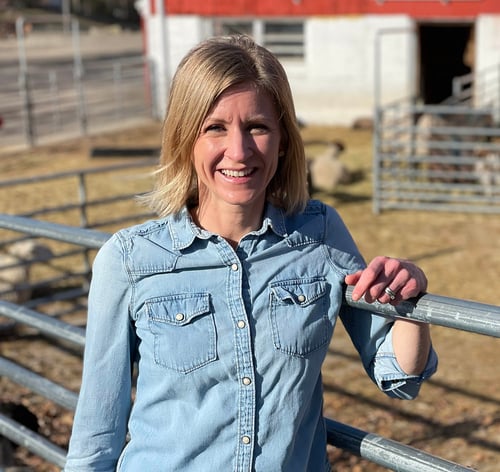Loading component...

Brooke Larm earned a B.A. in elementary education in 2003 with concentrations in English, Spanish and environmental science in the College of Education. She earned an M.A. in teaching and curriculum in 2020 with concentrations in K-12 administration and nature-based early childhood education through coursework at Antioch University New England. Larm currently serves as a director on the MSU College of Education Alumni Board and is the education specialist at Bowers School Farm and Johnson Nature Center, owned and operated by Bloomfield Hills Schools.
As a young child, I spent the majority of my waking hours either at school or playing outside with my brother and cousins. I often tell the story of how my return to school each fall during my early childhood years was accompanied by the strange sensation of wearing shoes again after summers spent barefoot running the banks of the AuSable River and through the forests of my hometown of Grayling, Michigan. I have no doubt my early play and learning experiences outdoors heavily influenced the path I chose.
During my undergraduate and intern experience, I had the good fortune of taking a math and science inquiry course with Dr. Amy Parks, associate professor in the Department of Teacher Education. She opened my eyes to the power of inquiry through students’ curiosities. At the same time, I taught alongside Barbara Kallman, my second-grade mentor teacher who integrated science into every aspect of the curriculum and utilized the school grounds as our classroom at every opportunity. I still vividly remember guiding students through the experiences of writing in the forest, engaging in science experiments focused on wind speed and direction on the playground, and creating art depicting the large maple tree in the front lawn of the school in each of the four seasons.
After experimenting in a variety of teaching settings from Mexico to Germany and in the U.S., I discovered my ideal classroom: the outdoors. I’m not alone. A recent report shows the number of nature preschools and forest kindergartens has doubled since 2017 and has seen a 25-fold increase in the past decade, highlighting the interest and demand among educators, parents and children for learning experiences beyond the classroom walls.
The evidence for the benefits of outdoor learning for students of all ages continues to grow. Through my work and research at MSU Tollgate Farm and Education Center, we discovered the incredible impact a farm- and nature-based program has on preschoolers, including improved conversation skills, the ability to ask more in-depth questions and improvements in decision-making skills. The program’s impact extended to the families and included increased time spent outdoors together, increased time spent gardening and increased conversation about the sources of their food. Preschoolers who plant and tap trees, care for farm animals, harvest produce and navigate the ever-changing outdoor environment build the kind of skills that lay a strong foundation for the future.
The pandemic has elevated the case for outdoor learning, allowing it to take the stage, not only as a short-term solution to safely bringing students back to school but also as a long-term solution due to the myriad of benefits it provides for learners.
Today, I continue the work of supporting teachers and students in taking learning outside. In the summer of 2020, Green Schoolyards America sparked the National COVID-19 Outdoor Learning Initiative to draw together experts across the nation to create a resource to support schools and districts to move their classes outside during the pandemic, an initiative and organization I’ve supported and for which I advocate.
A special initiative I’m currently involved with is the design and construction of a children’s garden at Bowers School Farm in Bloomfield Hills, Michigan. Dr. Norm Lownds, curator of the 4-H Michigan Children’s Garden at MSU, and Alan Jaros, director of Bowers School Farm, are my partners in leading this initiative. The heart of our work is to build and to engage our community with local food and nature. The Bowers School Farm Children’s Discovery Garden will be a place we intend to gather and engage both our local and neighboring students and communities, including Birmingham and Pontiac, while also serving to inspire and support area educators in creating outdoor learning spaces in their own schoolyards. If ever there was a time to build such a garden, it is now when we’re all in need of a reprieve from technology and a deeper connection to each other and the land.
I continue to wonder what would happen if time spent barefoot in nature was a common part of every teacher and student’s school day? How might it shift our behaviors and attitudes as a whole to create a healthier, more sustainable life and planet? I’m hopeful outdoor learning will become the norm in my lifetime. For me personally, teaching and learning outdoors inspire creativity and innovation and provides me with a deep sense of purpose. It’s no wonder that I wake up each day happy to go to work.